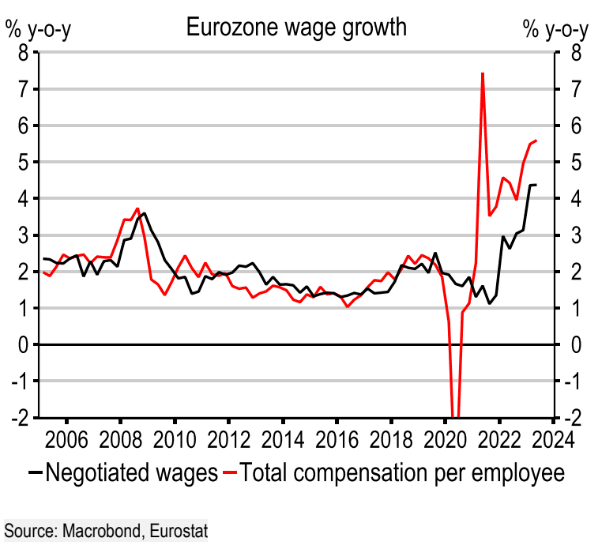ECB Won't Cut Rates Until Late 2024: HSBC
- Written by: Sam Coventry
-

Image © European Commission Audiovisual Services
Wages are front and centre for European Central Bank deliberations over when to cut interest rates, and looming collectivised wage increases will ensure the first cut won't be until late in 2024.
This is according to HSBC, whose economists say wages will be the most important driver of
underlying inflationary pressure in the next few quarters.
The findings are at odds with a market that has 'priced in' as many as four rate cuts from the ECB for 2024, suggesting potential mispricing in Eurozone bonds and the Euro.
HSBC's estimates suggest that wages must fall back to the 3-3.5% range in order for Eurozone inflation to fall back to the 2.0% target, which won't happen soon as the latest negotiated pay deals are in the 6% year-on-year region, including one-off payments.
Above: "Negotiated pay is still rising" - HSBC.
The ECB's forward-looking wage tracker suggests negotiated pay rises should hover around 4.5% through the first half of 2024.
Fabio Balboni, Senior Economist at HSBC, says job postings from Indeed show that pay growth has already eased towards the 3.5% mark in the Eurozone after having touched 5% earlier this year.
But he explains only about one in six/seven European workers change jobs each year.
"About two-thirds of the workforce are covered by collective pay deals, typically covering 12-18 months," he says. "Negotiated pay rises are determined much more by past inflation (with a lag of about a year) than current labour market slack."
Balboni looks for the first rate cut by the ECB to take place in Q4 2024, and a rate cut in H1 2024 is highly unlikely.
According to HSBC, the market is expecting two cuts by July and four over the course of next year.
Should rate expectations adjust higher relative to elsewhere, Eurozone bond yields and the Euro would likely find support.
During the ECB's October policy meeting, President Christine Lagarde said next year’s wage bargaining agreements would prove to be a key piece of information when setting interest rates.
The ECB would have a "wealth" of intelligence "when collective bargaining agreements [...] for 2024 will be completed", which will be "way into 2024." The account of the October ECB meeting also notes that "the picture for wage developments would only gradually crystallise during the course of next year."
"Higher than anticipated increases in wages or profit margins, or a lasting rise in inflation expectations above target, could also drive inflation higher, including over the medium term," said the ECB.

